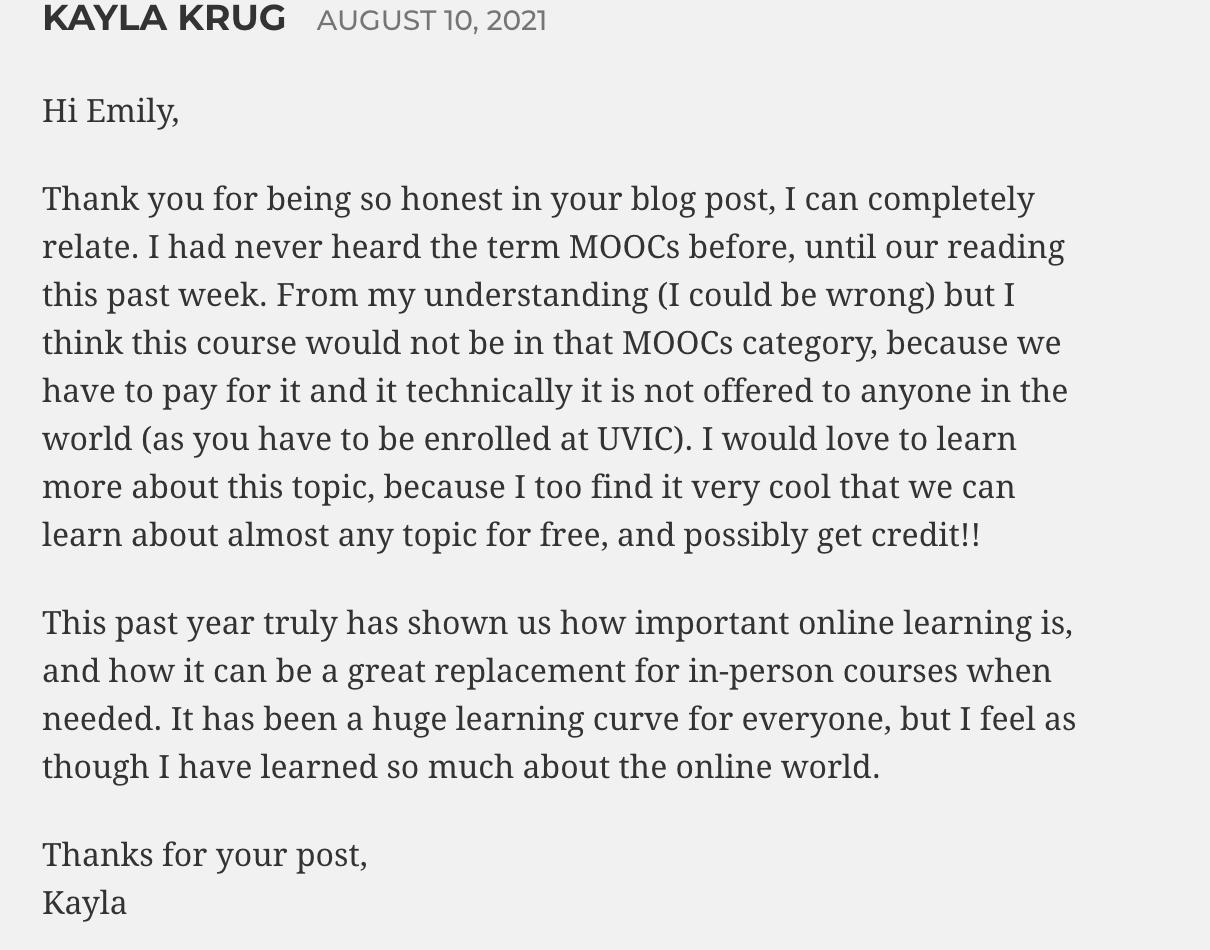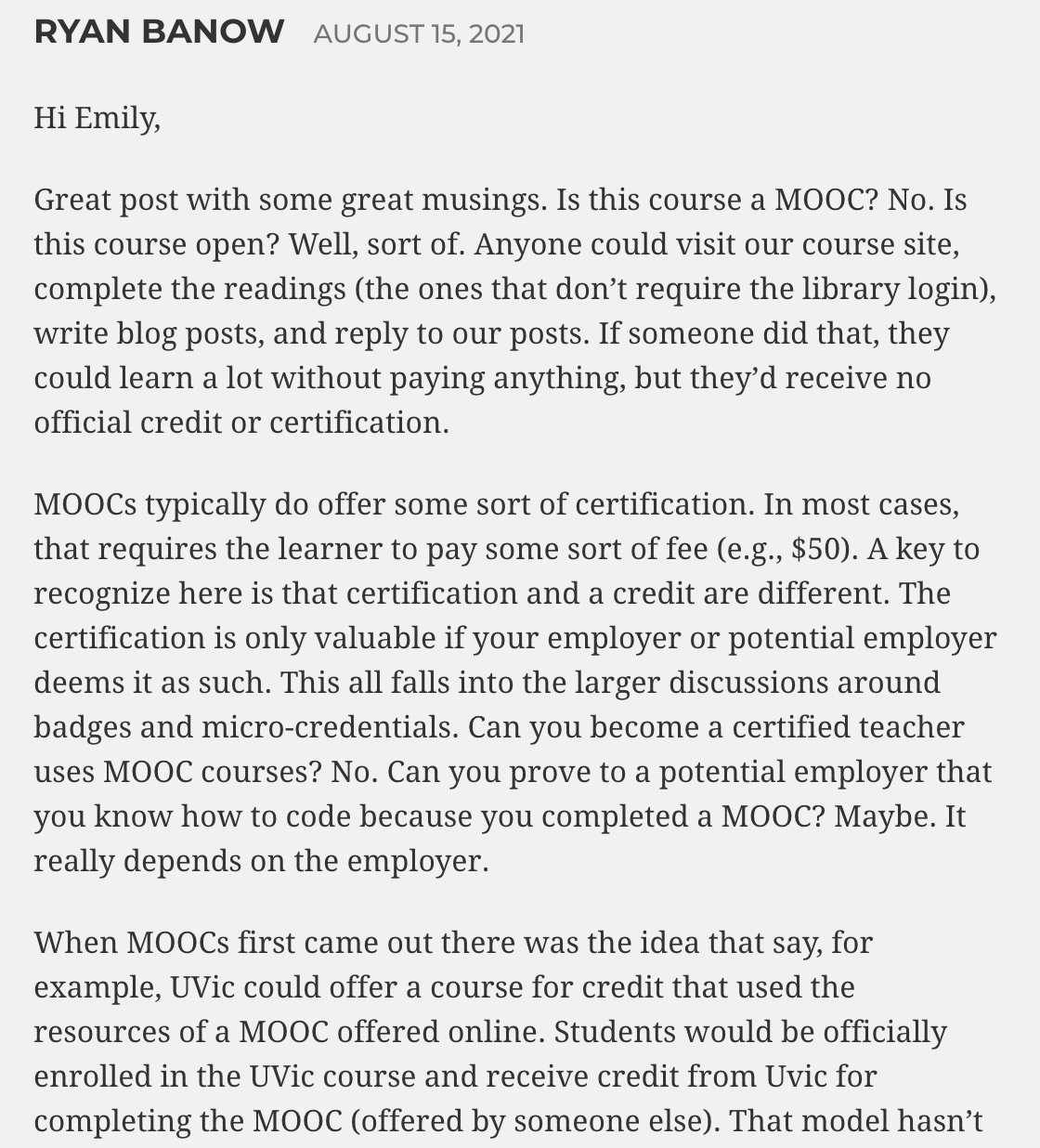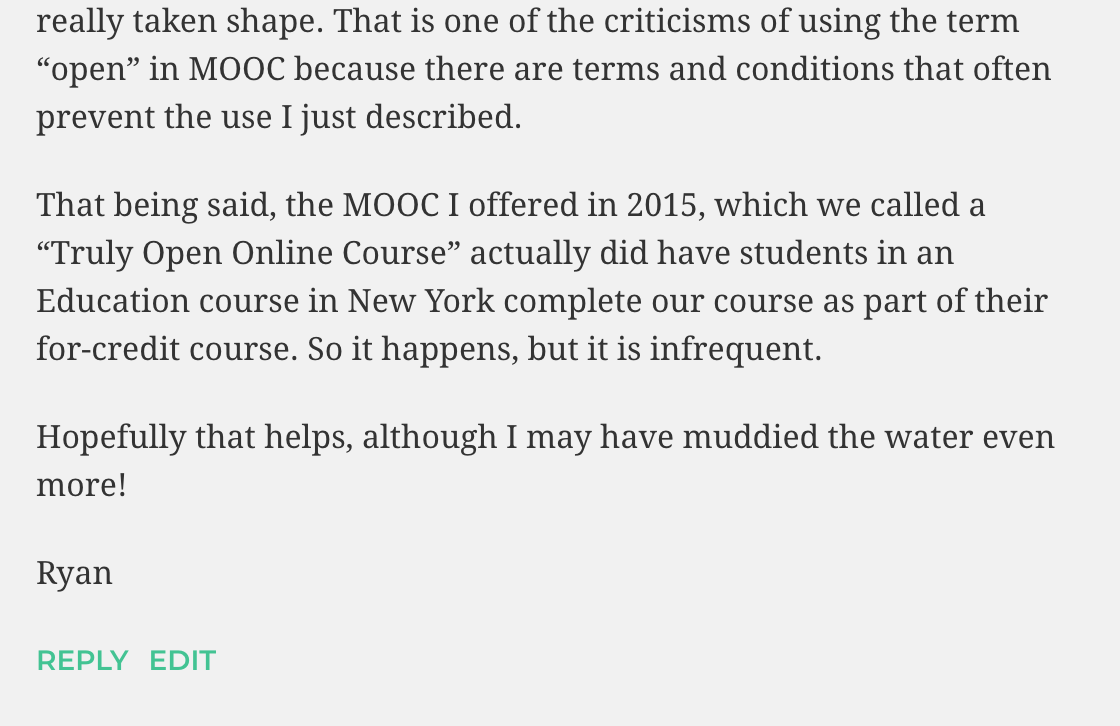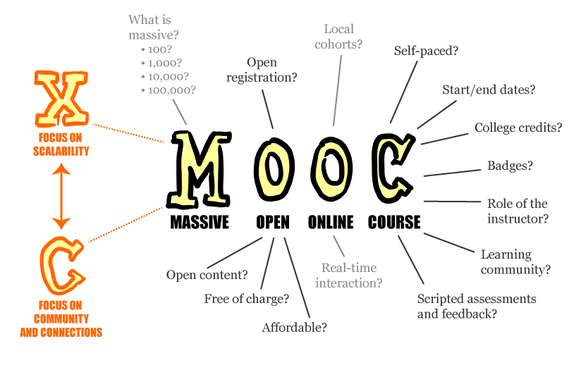For my showcase blog post, I have decided to go with my topic #2 discussion: History and Context of Distributed and Open Learning
The original post:
The readings this week were a bit trickier for me to get a grasp of. I have heard of open and distributed learning before, but there were a whole bunch of new terms that I had never heard of before. One of note was the concept of MOOC’s (massively open online courses). This was a bit harder to wrap my head around, about what would consist of an open online course. I am not sure if the course we are in is considered an open online course? I don’t think that it is “massive”, so it would not fall under a MOOC category, but is it open, even though you have to enroll in it and pay for it? Someone help me out!
Then, I researched it and found this website, a huge list of a bunch of online courses you can take, for free! These range from language courses to engineering courses. I am curious though, if you get any sort of certification for completing them? Would taking some of these courses help you in your career or job? So interesting! Major’s (2015) article states that participation in these MOOC courses are usually free, until a participant wishes to use them for a credit, in which there are fees attached (p. 78). I have certainly never heard of these types of courses, but I am definitely wanting to look into them, especially if I can get credit for them!
In the other reading, it was interesting to learn about the history of open educational resources and social media. I have learned a lot about OER in the past year, and I had no idea the concept was around 20 years old. It is great to see how far these resources have come, from initially focussing on learning objects, open source education and OpenCourseWare (Jordan & Weller, 2017), to what we have now is really amazing. We use OER’s every day, like Wikipedia, TED, Vimeo, and I’ve also used Unsplash in the past for my WordPress blog!
Within the past year and a half, during the pandemic, students across the globe have had to adjust their typical learning practices to be fully online. I have learned so much in the past year about my ability to use a laptop! I know some people who went to UVic pre-COVID, and didn’t even own a laptop. These readings reflect the importance that online learning has on us today. If it weren’t for all the resources we have available today, I don’t know how students would have been successful in a pandemic 20 years ago. We are really lucky! Overall, I learned a lot with these two readings this week.
References:
edX (2021). About MOOCs. Retrieved from https://www.mooc.org/
Jordan, K. & Weller, M. (2017). Openness and Education: A beginners’ guide. Global OER Graduate Network.
Major, C. H. (2015). Teaching Online – A Guide to Theory, Research, and Practice. Pp. 76-108. Retrieved from http://ebookcentral.proquest.com/lib/uvic/detail.action?docID=3318874
University of Pittsburgh (2021). OER – Open Educational Resources: Big List of Resources. Retrieved from https://pitt.libguides.com/openeducation/biglist
Continued:
I decided to choose this post as my showcase blog because I feel that from the time I posted it, to now, I have learned the most from it. In this post, I was unsure about a lot of the concepts we were learning in this course. More specifically, what is a MOOC?! This was also when we first started to really dive in to the concept of open and distributed learning. I felt pretty lost, and was hoping for some help from my colleagues.
And boy did they ever!
Kayla helped confirm my understandings with her comment, and gave me a little insight into whether our course was considered a MOOC or not.

Ryan also stepped in on this blog post, and really helped me to understand what the whole post was even about.


I was able to get this clarification from my colleagues and teacher, simply because I was a part of their online learning community! I love that we have the ability to do this in these open or distributed learning courses.
I also did my own research, and found some helpful resources to delve a bit deeper into the concept of MOOC’s (shown below). The YouTube video defines what goes on in a MOOC, and what you essentially do in a MOOC. Wikipedia was helpful too, and provided me a nice graphic to explain it.

Graphic from Wikipedia explaining the term “MOOC”
I can now proudly say that I know what a MOOC is, and how interested I am in pursing it. I would love to be able to take a MOOC in the future! I would happily pay a fee if it meant I would get credit for an online open course. I really like the style of open learning, and I think I learn the best from it.
Also mentioned in my post were a few brief OER resources that I had discovered and had used in the past. Below are a list of some more OER’s that I came across since this post, that I think are very beneficial to my future as a teacher:
Khan Academy – A great resources for students and educators, openly distributed videos and content to help with any subject area
Unsplash – Over a million open access photos, free to download and no permission needed
BC OpenEd – A curated collection of open textbooks, many reviewed by British Columbia faculty.
Scratch – A coding-for-kids software that allows students and educators to create animations to share with anyone
Pixton – A great resource for comic making, students and educators can create avatars and comics to be shared with anyone
Powtoon – A whiteboard animation software allowing students and educators to create animations to share with anyone
These are just some examples of great OER’s that I came across. There are so many great resources that we can use as educators to create an open learning environment, even in the elementary ages.
With all I have learned throughout this course, I am well on my way to curating my “teaching toolkit”. I have collected so many resources, not only in this class, but also all of my other Ed-tech classes! I am excited to introduce these resources when I start teaching, to make my classroom an open and accepting environment for everyone in it.
